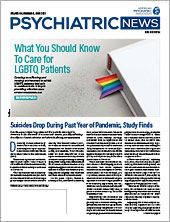In April the Food and Drug Administration (FDA) approved Qelbree (viloxazine extended-release capsules), a selective norepinephrine reuptake inhibitor, for the treatment of attention-deficit/hyperactivity disorder (ADHD) in pediatric patients aged 6 to 17 years. Qelbree is not a stimulant and is not a controlled substance.
In three separate phase 3 trials involving 1,118 patients aged 6 to 17 years, patients who took Qelbree experienced a greater improvement in ADHD symptoms compared with those who took placebo, as measured by the ADHD Rating Scale and the Clinical Global Impression-Improvement score. Doses during the trials ranged from 100 mg to 400 mg.
The recommended starting dose for patients 6 to 11 years old is 100 mg once daily. The recommended starting dose for patients 12 to 17 years old is 200 mg once daily. Dosages for both age groups may be titrated up to 400 mg once daily. Qelbree is taken once daily, and capsules may be broken open and sprinkled on applesauce or swallowed whole.
David Rettew, M.D., the medical director of the Child and Adolescent and Families Division of the Vermont Department of Mental Health and an associate professor of psychiatry and pediatrics at the University of Vermont, said he sees where Qelbree may provide a new treatment option for several patient populations.
“One would be the child or adolescent who can’t take stimulant medications due to side effects,” Rettew told Psychiatric News. “Since Qelbree doesn’t have the on/off quality of stimulants where the benefits wear off during the day, there also could be interest in patients and families looking for a more even effect throughout the day. Finally, its use might be considered in individuals with substance use histories where there could be concern about using controlled substances like stimulants.”
Qelbree’s label contains a boxed warning that the medication may increase the risk of suicidal thoughts and behaviors. The warning advises health professionals who prescribe Qelbree to monitor patients closely for “clinical worsening and emergence of suicidal thoughts and behaviors, especially during the initial few months of drug therapy, and at times of dosage changes.”
Data from the clinical trials also suggest that the medication may induce manic or mixed episodes in patients with bipolar disorder, and the label cautions that patients should be screened to determine if they are at risk for bipolar disorder.
Between 22% and 31% of patients who received Qelbree in the clinical trials experienced an increase in heart rate of at least 20 beats a minute and a 15-point increase in their diastolic blood pressure. The label advises that health professionals should assess their patients’ heart rate and blood pressure prior to initiating treatment and when increasing dosages. However, this may be easier said than done during the pandemic.
“Right now, so many medical appointments are being done via telemedicine, and vital signs are more difficult to get,” said Rettew. Rettew noted that viloxazine was marketed as an antidepressant in other countries before being marketed as a treatment for ADHD in the United States.
“[Qelbree] therefore has many of the same warnings [as antidepressants], such as the potential for increased suicidal thoughts and activation of mania. Some of the blood pressure and pulse increases have also been found with antidepressants that have norepinephrine reuptake properties such as venlafaxine,” he said. “While the medication is touted as working as a norepinephrine reuptake blocker, there is some research suggesting that it also acts on serotonin, similar to many other antidepressants.”
Rettew said he will keep an open mind about Qelbree, but that it would not surprise him if it is seen as similar to another nonstimulant medication for ADHD, Strattera (atomoxetine).
“[Strattera] is often pretty well tolerated but there have been some data suggesting that it may not result in as much improvement in core ADHD symptoms as the stimulants. From some of the data from initial trials, it looks like Qelbree could be in the same boat,” Rettew said.
“It is also worth noting that all of the ADHD trials [for Qelbree] have been short, just a matter of weeks. Long-term data are really needed, although we do have a long track record of [viloxazine’s] use as an antidepressant.”
Rettew is not affiliated with Supernus Pharmaceuticals and was not involved in clinical trials of Qelbree. ■
Full prescribing information for Qelbree is posted
here.

